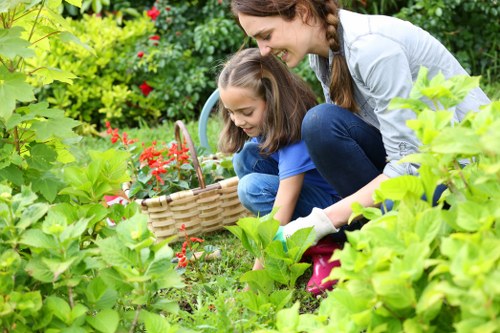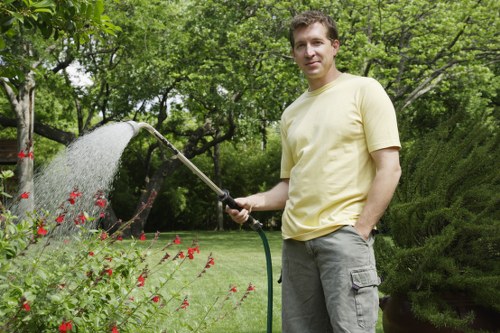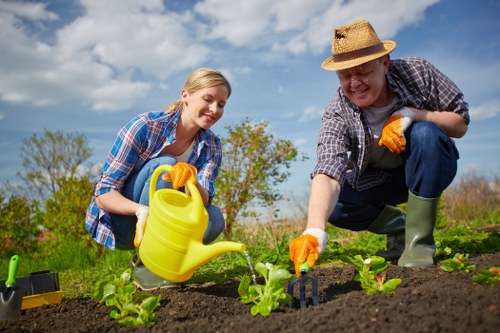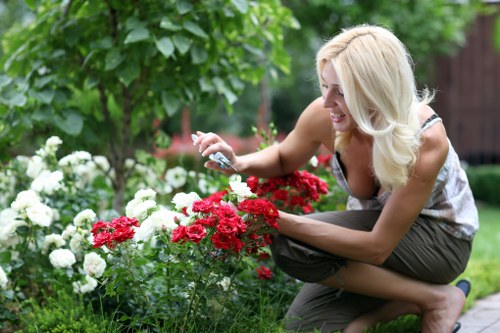Comprehensive Guide to Garden Maintenance in Chigwell

Maintaining a beautiful garden in Chigwell requires dedication, knowledge, and the right set of tools. Whether you're a seasoned gardener or a beginner, understanding the local climate, soil conditions, and plant varieties is essential for a thriving outdoor space.
Chigwell, with its picturesque landscapes and temperate climate, offers an ideal environment for a diverse range of plants. However, to achieve a lush and vibrant garden, regular maintenance and care are paramount.
In this article, we'll explore the key aspects of garden maintenance in Chigwell, providing you with practical tips and insights to keep your garden in optimal condition throughout the year.

The Importance of Regular Garden Maintenance
Regular garden maintenance is crucial for several reasons. It not only enhances the aesthetic appeal of your property but also promotes the health and longevity of your plants.
Neglecting garden upkeep can lead to overgrown weeds, diseased plants, and a generally unkempt appearance. Moreover, a well-maintained garden can significantly increase the value of your home and provide a serene environment for relaxation and recreation.
By investing time and effort into garden maintenance, you're ensuring that your outdoor space remains inviting and sustainable for years to come.

Seasonal Garden Maintenance Tips
Spring Maintenance
Spring is a critical time for garden maintenance. As the weather warms up, it's essential to prepare your garden for the growing season.
Start by clearing any debris left over from winter. Prune dead branches, and trim overgrown shrubs to encourage healthy growth. Additionally, spring is the perfect time to sow new seeds and plant fresh blooms.
Regular watering and fertilizing during this period will provide your plants with the necessary nutrients to flourish.
Summer Maintenance
During the summer months, the focus should shift to managing the increased growth and ensuring plants are adequately hydrated.
Implementing a consistent watering schedule is vital, especially during dry spells. Mulching can help retain moisture in the soil and suppress weed growth.
Regular weeding and monitoring for pests and diseases will keep your garden healthy and vibrant.

Essential Tools for Garden Maintenance
Having the right tools is fundamental to effective garden maintenance. Investing in quality equipment can make the tasks easier and more efficient.
Basic Gardening Tools
- Hand Trowel
- Pruning Shears
- Garden Fork
- Watering Can or Hose
- Gloves
Advanced Equipment
- Lawn Mower
- Hedge Trimmer
- Leaf Blower
- Soil Tester
- Compost Bin
Using these tools correctly can enhance your efficiency and ensure that your garden receives the proper care it needs.

Professional Garden Maintenance Services in Chigwell
While DIY garden maintenance is achievable, sometimes enlisting the help of professionals can make a significant difference.
Professional garden maintenance services in Chigwell offer expertise in plant care, landscape design, and seasonal upkeep. These services can be tailored to meet your specific needs, ensuring that your garden remains in top condition regardless of your schedule or expertise.
By hiring professionals, you can save time and ensure that your garden benefits from the latest techniques and knowledge in horticulture.
Benefits of Hiring Professionals
- Expertise in plant selection and care
- Time-saving and efficient maintenance
- Customized maintenance plans
- Access to specialized tools and equipment
- Enhanced garden aesthetics and functionality
Whether you need regular maintenance or a one-time service, professional gardeners can provide the support necessary to keep your Chigwell garden flourishing.
Choosing the Right Plants for Your Chigwell Garden
Selecting the appropriate plants is a cornerstone of successful garden maintenance. In Chigwell's climate, it's essential to choose varieties that thrive in temperate conditions and resist local pests and diseases.
Popular Plant Varieties in Chigwell
- Roses
- Lavender
- Hostas
- Hydrangeas
- Boxwoods
These plants are not only visually appealing but are also well-suited to the local environment, ensuring minimal maintenance and robust growth.
Native vs. Exotic Plants
While exotic plants can add unique charm to your garden, native plants often require less maintenance and are more resilient. Balancing both native and exotic varieties can create a diverse and sustainable garden.
Soil Health and Fertilization
Healthy soil is the foundation of a thriving garden. Regular soil testing can help determine nutrient levels and pH balance, allowing for appropriate amendments.
Organic fertilizers and compost are excellent choices for enriching the soil, promoting strong root systems and vibrant plant growth.
Composting
Composting is an eco-friendly way to recycle garden waste into valuable nutrients for your plants. It improves soil structure, moisture retention, and microbial activity.
Irrigation Practices
Efficient irrigation practices, such as drip irrigation or soaker hoses, can conserve water while providing consistent moisture to your plants. Scheduling watering during the early morning or late evening reduces evaporation and ensures optimal hydration.
Pest and Disease Management
Managing pests and diseases is essential for maintaining the health of your garden. Regular inspections and early detection can prevent infestations from spreading and causing significant damage.
Integrated Pest Management (IPM)
- Monitoring and identifying pests
- Implementing biological controls
- Using chemical treatments as a last resort
- Promoting natural predators
- Maintaining healthy plants through proper care
Adopting an IPM approach ensures minimal environmental impact while effectively managing pest-related issues.
Organic Treatments
Organic treatments, such as neem oil, insecticidal soaps, and beneficial nematodes, offer natural alternatives to chemical pesticides. These solutions are safer for beneficial insects and the broader ecosystem.
Lawn Care in Chigwell
A well-maintained lawn adds structure and beauty to your garden. Proper lawn care involves regular mowing, aeration, fertilization, and watering.
Mowing Techniques
Maintaining the right grass height promotes healthy growth and discourages weed invasion. It's advisable to mow frequently during the growing season, removing no more than one-third of the grass blade at a time.
Aeration and Fertilization
Aerating your lawn helps improve soil compaction and enhances nutrient absorption. Regular fertilization supports robust grass growth and color.
Weed Control
Controlling weeds is essential for a pristine lawn. Using pre-emergent herbicides and manual removal can keep unwanted plants at bay, ensuring your grass remains lush and uniform.
Hardscaping and Garden Structures
Incorporating hardscaping elements like pathways, patios, and garden structures can enhance the functionality and aesthetic appeal of your garden.
Pathways and Patios
- Stone walkways
- Brick patios
- Gravel paths
- Decks
These structures provide easy navigation and create designated areas for relaxation and entertainment.
Garden Structures
Additions such as pergolas, gazebos, and arbors can offer shade, support climbing plants, and serve as focal points in your garden design.
Eco-Friendly Garden Practices
Adopting eco-friendly practices contributes to a sustainable garden ecosystem. Implementing these strategies not only benefits the environment but also enhances the resilience of your garden.
Rainwater Harvesting
Collecting rainwater for irrigation reduces reliance on municipal water sources and supports plant hydration during dry periods.
Composting and Recycling
Recycling garden waste through composting enriches the soil and minimizes landfill contributions.
Sustainable Planting
Choosing drought-resistant and native plants conserves water and supports local biodiversity.
Lighting and Garden Aesthetics
Proper lighting can transform your garden into a magical space during the evenings. It highlights key features and ensures safety.
Types of Garden Lighting
- Pathway lights
- Spotlights
- String lights
- Solar-powered lights
Strategically placing lights can accentuate plant features, sculptures, and walkways, creating an inviting ambiance.
Aesthetic Enhancements
Incorporating elements like garden art, bird baths, and decorative planters can add personality and charm to your outdoor space.
Maintaining Garden Tools and Equipment
Proper maintenance of your garden tools ensures their longevity and efficient performance. Regular cleaning, sharpening, and storage are essential practices.
Cleaning and Sharpening
After each use, clean tools to remove dirt and debris. Sharpen blades regularly to ensure precise cutting and reduce strain during use.
Storage Solutions
Store tools in a dry, organized space to prevent rust and damage. Using tool racks or sheds can keep your equipment easily accessible and in good condition.
Creating a Year-Round Maintenance Schedule
Establishing a maintenance schedule helps in keeping track of tasks and ensures that your garden receives consistent care throughout the year.
Monthly Task List
- January: Plan garden layout and order seeds.
- February: Begin pruning and preparing soil.
- March: Start planting early spring vegetables and flowers.
- April: Mulch beds and start regular watering.
- May: Fertilize and control weeds.
- June: Monitor for pests and diseases.
- July: Maintain irrigation systems.
- August: Harvest summer crops.
- September: Prepare for autumn planting.
- October: Rake leaves and compost garden waste.
- November: Protect plants from frost.
- December: Review garden progress and plan for next year.
Adjusting for Weather Variations
Be prepared to adjust your maintenance schedule based on unexpected weather changes. Keeping an eye on forecasts can help you respond promptly to protect your garden.
Gardening Resources in Chigwell
Utilizing local resources can enhance your garden maintenance efforts. Chigwell offers various nurseries, garden centers, and community groups dedicated to gardening.
Local Nurseries and Garden Centers
- Chigwell Garden Supplies
- Green Thumb Nursery
- Blooming Gardens
- Flora & Fauna Garden Center
- Evergreen Plants
These establishments provide a wide range of plants, tools, and expert advice to support your gardening needs.
Community Gardening Groups
Joining local gardening clubs or groups can offer valuable insights, shared resources, and a sense of community among fellow gardeners.
Conclusion
Effective garden maintenance in Chigwell involves a combination of regular care, proper planning, and utilization of available resources. By following the tips outlined in this guide, you can cultivate a thriving, beautiful garden that enhances your living space and provides lasting enjoyment.
Whether you choose to maintain your garden independently or seek professional services, the key is consistency and attention to detail. Embrace the gardening journey and watch your Chigwell garden flourish.
Contact us today to book your garden maintenance service and transform your outdoor space into a stunning haven.